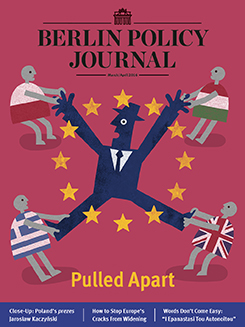Berlin Policy Journal
International affairs from the heart of Europe

International affairs from the heart of Europe

Moscow’s warnings of a “new Cold War” are out of sync with today’s realities.
Greece’s “self-evident revolution” (Η επανάσταση του αυτονόητου) stumbles over its children’s basic understanding of what’s right and what’s wrong.
The United Nations is set up in a way that is outdated, a fact apparent in the composition of the Security Council. Can the system be reorganized?
Poland’s former foreign minister argues that Berlin needs to lead through EU institutions, not solo, and won’t spill the beans about Oxford’s Bullingdon Club.
Of the 100 top high-tech companies worldwide, only eight are based in Europe. Why are we lagging behind? It’s our risk-averse nature, says Airbus Group CEO TOM ENDERS.
The question of whether sending ground troops to fight IS is dividing Europe.
Europe has fallen behind the United States and Asia in a number of areas that will be key to economic success in the future. The EU will have to take a few key steps if it is to make up lost ground.
The “convergence machine” was designed to build wealth within the continent while helping its lagging members catch up. Now, however, the same mechanisms are rendering the currency union less flexible.
It has become the economistʼs holy grail – but competitiveness is too nebulous to guide policy. Increasing productivity should be Europe’s real concern, and this requires a comprehensive reform agenda.
There are lessons to be learned from the terror attacks on Paris, says ROBERT MUNKS, Editor of IHS Janeʼs Intelligence Review. Military budgets and more manpower alone will not tackle IS’s dark appeal to vulnerable youths.
After hundreds of thousands of dead, and millions of refugees, the EU urgently needs to take the lead in ending the brutal civil war in Syria that has transformed the country into a geopolitical battleground.
The opportunity to establish a no-fly zone has passed. Any Western intervention should now focus on a no-bomb zone to protect civilians and on weakening Bashar al-Assad.
Two approaches to policymaking are currently competing: one prefers to smash problems as they arise, while the other would rather disentangle them. Which one makes sense, and when?
IS is more of a sect than a terrorist organization, isolating its members and providing them with an end-of-days ideology. Reintegration of IS fighters will be nearly impossible.
Italian Prime Minister Matteo Renzi has long advocated a dramatic break from the country’s political past. Such straightforwardness, however, does not suit most politicians – especially the cerchiobottisti, who make much ado but do not do much.
Syriza’s election was supposed to mark a new direction for Greece. Instead, conditions have steadily worsened. The country is in dire eco-nomic shape and faces the brunt of the refugee crisis.

